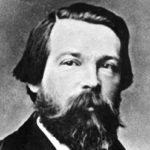Friedrich Nietzsche biography, quotes and books

Friedrich Nietzsche (October 15, 1844 – August 25, 1900) was not only a well-known German philosopher and culture critic, but also a composer, poet and philologist (a type of linguist). He is considered one of the most influential modern thinkers. Friedrich Nietzsche was most known for his radical criticism of the Western rationalist tradition and traditional European morality and religion. His ideas of atheism were reflected in his statements such as ‘God is dead’. He argued that heaven was an unreal place, and that the emergence of science would lead to the death of Christianity.
Biography of Friedrich Nietzsche
Nietzsche was born on the 15th of October in 1844 in Röcken, Germany. He grew up being surrounded by women: his mother Franziska, his 2 year younger sister Elisabeth, his grandmother and his two aunts. His father Karl, a Lutheran minister, died when Friedrich was only 4 years old.
After his father’s death the family moved to Naumburg. Here he went to a nearby high school, called Schulpforta – or Pforta – which was a former monastery and a school for gifted students. He then continued his studies at the University of Bonn, where he started to study Theology, but later transferred to Philology.
In 1865 Friedrich Nietzsche learned about the work of German philosopher Arthur Schopenhauer. He was greatly inspired by Schopenhauer’s book ‘The World as Will and Representation’. In this book, Schopenhauer argued that the world humans experience does not exist in itself, but exists only as a representation of a cognizing subject. He considered it an objectification of the one will, the inner essence of everything.
Schopenhauer’s ideas shifted Nietzsche’s interest from philology to philosophy from then onwards. In his early life as a philosopher he was greatly influenced by Schopenhauer’s work, as well as the work of Friedrich Albert Lange, a German philosopher and sociologist, and Richard Wagner, a German poet and composer. Nietzsche became friends with Wagner, when he was appointed as a professor at the University of Basel in 1869.
Later Life
In 1875 Nietzsche suffered an intellectual and emotional crisis, which was followed by a break from Wagner’s and Schopenhauer’s ideas. Where he initially wrote his essay ‘Schopenhauer as Educator’ in 1873, he now confessed at the end of 1876 that he could no longer support Schopenhauer’s philosophy.
By 1878 Friedrich Nietzsche publicly distanced himself from his own previous views, and transitioned more towards the philosophical school of positivism. Reason, logic and science were then placed before art, introspection and intuition.
In 1879 Nietzsche had to give up his position as professor at the University of Basel due to his deteriorating health. He suffered from migraine attacks, nausea and trouble with his eyesight, to the point that he could no longer perform his tasks. He therefore traveled to the warmer climates of Sils, Nice, Genoa and Turin, amongst others, in the hopes of improving his health.
The death of Friedrich Nietzsche
In January 1889, at the age of 44, Nietzsche collapsed mentally in the streets of Turin. He seemed to become delusional, wandering the streets naked and even threatening to have the German emperor shot. Because of this mental breakdown, his friend Franz Overbeck brought Friedrich to Basel, where he was extensively examined in a psychiatric institution.
Initially he was still somewhat approachable, but he gradually became more apathetic, to the point that he no longer recognized his friends. The last 11 years of his life, from 1889 to 1900, Nietzsche was also no longer able to care for himself, let alone write. When treatment proved definitively impossible and unsuccessful, his mother and sister took care of him.
Until recently, most experts assumed that Nietzsche’s mental decline was the result of syphilis, which he caught in his early years, visiting a brothel during his studies. Later diagnoses, however, include possible degeneration of the cerebral blood vessels and a tumor of the meninges behind his right eye.
Friedrich Nietzsche eventually died of a stroke, complicated by pneumonia, on August 25, 1900, at the age of 55.
Friedrich Nietzsche and Philosophy
Nietzsche’s work shows his willingness to contradict himself and revise his views. Due to these contradictions in his work, his development can be roughly divided into three phases:
- First period: Nietzsche idolizes Schopenhauer and Wagner, as well as the art and culture of the ancient Greeks.
- Second period: Nietzsche turned against his previous ideals, and now looked at everything more from the philosophical view of positivism.
- Third period: Nietzsche developed his own theory of value, breaking away from positivism, with concepts such as ‘God is dead’, ‘the will to power’ and ‘the eternal recurrence’.
Nietzsche is arguably most famous for his criticisms of traditional European morality and religion (Christianity). He proclaimed the famous statement that ‘God is dead’. This idea was not so much that atheism is true, but that Christianity was on its demise. Therefore, the whole of European morality, which was built upon this religion, was destined for collapse.
He underpinned the damaging side of morality, making it hard for us humans to imagine ourselves living any other way. We are therefore faced with a challenging and long term restoration project, where our beloved way of life must be questioned, investigated, dismantled, and then reconstructed in a healthier way.
The most extensive development of this critique of morality appears in Nietzsche’s ‘On the Genealogy of Morality’. This work consists of three treatises, each devoted to a central moral idea:
- In the First Treatise, Nietzsche criticizes the idea that moral consciousness consists fundamentally in altruistic concern for others. Instead, he states that morality is all about a historical innovation. Due to historical events and hierarchy, our morality has amounted to a vindictive effort to poison the happiness of the fortunate elite, instead of a high-minded, dispassionate, and strictly rational concern for others.
- In the Second Treatise, which is about guilt and bad conscience, Nietzsche’s main concern is the danger he takes moralized guilt to pose to psychological health. A main thought is that guilt’s very purity makes it liable to turn against the agent herself. Free-floating guilt can lose its social and moral point and develop into a pathological desire for self-punishment.
- In the Third Treatise, Nietzsche explores the intensification of such self-punishment via the idealization of asceticism. He emphasizes that purified guilt is naturally recruited as a tool for developing asceticism. His fundamental objection to asceticism is that it is psychologically destructive and practically self-defeating.
Nietzsche’s Outlook and Key Insights
Central to Nietzsche’s ideas is the realization that there is only one world with which we will have to learn to live. This world is a world of becoming and a blind play of forces, of which we ourselves are the products and bearers. We must not deny these powers, but must embrace both the liberating sides (like joy and strength) and the painful sides (like suffering and loss). Every temptation to seek an existence and justification thereof outside the pure naturalness of man is a weakening of life.
Nietzsche expected that nihilism would reach an absolute peak in the near future, where the Christian tradition will collapse. Change will then follow in the figure of Zarathustra. In Nietzsche’s 1885 book Also sprach Zarathustra, Zarathustra – an Iranese prophet from the 6th century – is the main character, who returns to preach the übermensch. He proclaims that there is only one world and that any hope of salvation from an upper world is in vain.
According to Nietzsche, eternity does not exist and therefore man is finite and will ultimately perish. One must be chastened by pain into ever stronger love for life as it is, and not as a weak will would wish it to be. For Nietzsche, the the ultimate test of the will to live is the question whether one would like to repeat life, painful as it is, infinitely, over and over again, never better or worse than it is now – ‘the eternal recurrence of the same’.
The übermensch is the embodiment of this will. The übermensch is the being ‘man’ who has transcended himself: “Man is something that must be overcome!” (Also sprach Zarathustra). Whether we will be able to fulfill the vocation of the übermensch will depend on a change in current morality.
This view is diametrically opposed to contemporary ethical objections. According to Nietzsche, he future will show whether man will have the courage to transcend himself.
Friedrich Nietzsche Quotes
- “And those who were seen dancing were thought to be insane by those who could not hear the music.”
- “Every deep thinker is more afraid of being understood than of being misunderstood.”
- “He who has a why to live for can bear almost any how.”
- “I am a forest, and a night of dark trees: but he who is not afraid of my darkness, will find banks full of roses under my cypresses.”
- “I cannot believe in a God who wants to be praised all the time.”
- “I’m not upset that you lied to me, I’m upset that from now on I can’t believe you.”
- “In heaven, all the interesting people are missing.”
- “In individuals, insanity is rare; but in groups, parties, nations and epochs, it is the rule.”
- “Is man merely a mistake of God’s? Or God merely a mistake of man?”
- “It is hard enough to remember my opinions, without also remembering my reasons for them!”
- “It is not a lack of love, but a lack of friendship that makes unhappy marriages.”
“Man is the cruelest animal.” - “No one can construct for you the bridge upon which precisely you must cross the stream of life, no one but you yourself alone.”
- “Sometimes people don’t want to hear the truth because they don’t want their illusions destroyed.”
- “That which does not kill us makes us stronger.”
- “The advantage of a bad memory is that one enjoys several times the same good things for the first time.”
- “The higher we soar the smaller we appear to those who cannot fly.”
- “The individual has always had to struggle to keep from being overwhelmed by the tribe. If you try it, you will be lonely often, and sometimes frightened. But no price is too high to pay for the privilege of owning yourself.”
- “The man of knowledge must be able not only to love his enemies but also to hate his friends.”
- “The snake which cannot cast its skin has to die. As well the minds which are prevented from changing their opinions; they cease to be mind.”
- “The surest way to corrupt a youth is to instruct him to hold in higher esteem those who think alike than those who think differently.”
- “There are no facts, only interpretations.”
- “There is always some madness in love. But there is also always some reason in madness.”
- “We should consider every day lost on which we have not danced at least once.”
- “When we are tired, we are attacked by ideas we conquered long ago.”
- “Whoever fights monsters should see to it that in the process he does not become a monster. And if you gaze long enough into an abyss, the abyss will gaze back into you.”
“Without music, life would be a mistake.” - “You have your way. I have my way. As for the right way, the correct way, and the only way, it does not exist.”
- “You must have chaos within you to give birth to a dancing star.”
Friedrich Nietzsche Books and Publications
Below you will find a list of publications by Friedrich Nietzsche in chronological order, with the English titles next to them.
- 1858. Aus meinem Leben (From My Life)
- 1858. Über Musik (On Music)
- 1862. Napoleon III als Praesident (Napoleon III as President)
- 1862. Fatum und Geschichte (Fate and History)
- 1862. Willensfreiheit und Fatum (Freedom of Will and Fate)
- 1863. Kann der Neidische je wahrhaft glücklich sein? (Can the Envious Ever Be Truly Happy?)
- 1864. Über Stimmungen (On Moods)
- 1864. Mein Leben (My Life)
- 1868. Homer und die klassische Philologie (Homer and the Classical Philology)
- 1872. Über die Zukunft unserer Bildungsanstalten (On the Future of our Educational Institutions)
- 1872. Fünf Vorreden zu fünf ungeschriebenen Büchern (Five Prefaces on Five Unwritten Books) comprising:
- Über das Pathos der Wahrheit (On the Pathos of Truth)
- Gedanken über die Zukunft unserer Bildungsanstalten (Thoughts on the Future of Our Educational Institutions)
- Der griechische Staat (The Greek State)
- Das Verhältnis der Schopenhauerischen Philosophie zu einer deutschen Cultur (The Relation between a Schopenhauerian Philosophy and a German Culture)
- Homers Wettkampf (Homer’s Contest)
- 1872. Die Geburt der Tragödie (The Birth of Tragedy)
- 1873. Über Wahrheit und Lüge im außermoralischen Sinn (On Truth and Lies in a Nonmoral Sense)
- 1873. Die Philosophie im tragischen Zeitalter der Griechen (Philosophy in the Tragic Age of the Greeks)
- 1873-1876. Unzeitgemässe Betrachtungen (Untimely Meditations) comprising:
- 1873. David Strauss: der Bekenner und der Schriftsteller (David Strauss: the Confessor and the Writer)
- 1874. Vom Nutzen und Nachtheil der Historie für das Leben (On the Use and Abuse of History for Life)
- 1874. Schopenhauer als Erzieher (Schopenhauer as Educator)
- 1876. Richard Wagner in Bayreuth
- 1878. Menschliches, Allzumenschliches (Human, All-Too-Human)
- 1879. Vermischte Meinungen und Sprüche (Mixed Opinions and Maxims; usually treated as the second part of Menschliches, Allzumenschliches)
- 1880. Der Wanderer und sein Schatten, 1880 (The Wanderer and His Shadow; usually treated as the third part of Menschliches, Allzumenschliches)
- 1881. Morgenröte, 1881 (The Dawn)
- 1882. Die fröhliche Wissenschaft (The Gay Science)
- 1882. Idyllen aus Messina (Idylls from Messina)
- 1883. Also sprach Zarathustra (Thus Spoke Zarathustra)
- 1886. Jenseits von Gut und Böse (Beyond Good and Evil)
- 1887. Zur Genealogie der Moral (On the Genealogy of Morality)
- 1888. Der Fall Wagner (The Case of Wagner)
- 1888. Götzen-Dämmerung (Twilight of the Idols)
- 1888. Der Antichrist (The Antichrist)
- 1888. Ecce Homo
- 1888. Nietzsche contra Wagner
- 1892. Dionysos-Dithyramben (Dionysian-Dithyrambs)
- 1901. Der Wille zur Macht, first published 1901
- 2010. The Peacock and the Buffalo: The Poetry of Nietzsche
- 2021. Nietzsche’s Last Twenty Two Notebooks: complete [1886-1889]
How to cite this article:
Baas, S. (2024). Friedrich Nietzsche. Retrieved [insert date] from Toolshero: https://www.toolshero.com/toolsheroes/friedrich-nietzsche/
Original publication date: 06/19/2024 | Last update: 06/19/2024
Add a link to this page on your website:
<a href=” https://www.toolshero.com/toolsheroes/friedrich-nietzsche/”>Toolshero: Friedrich Nietzsche</a>












